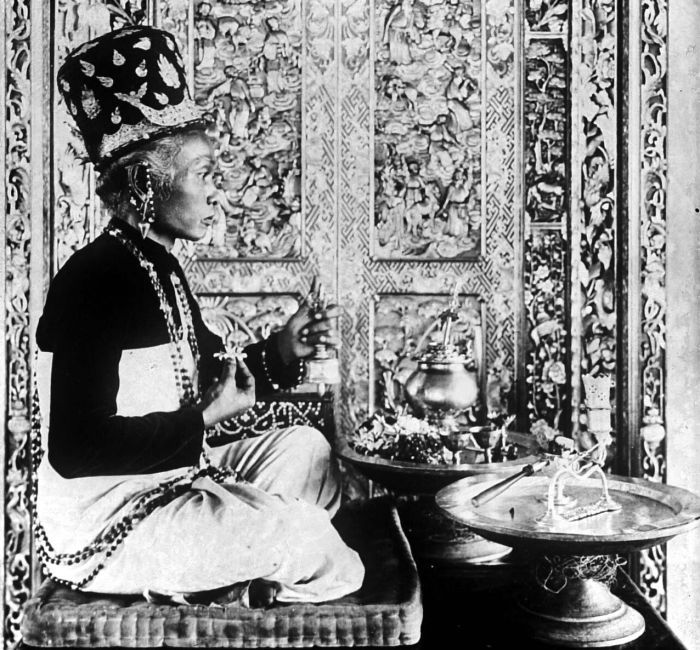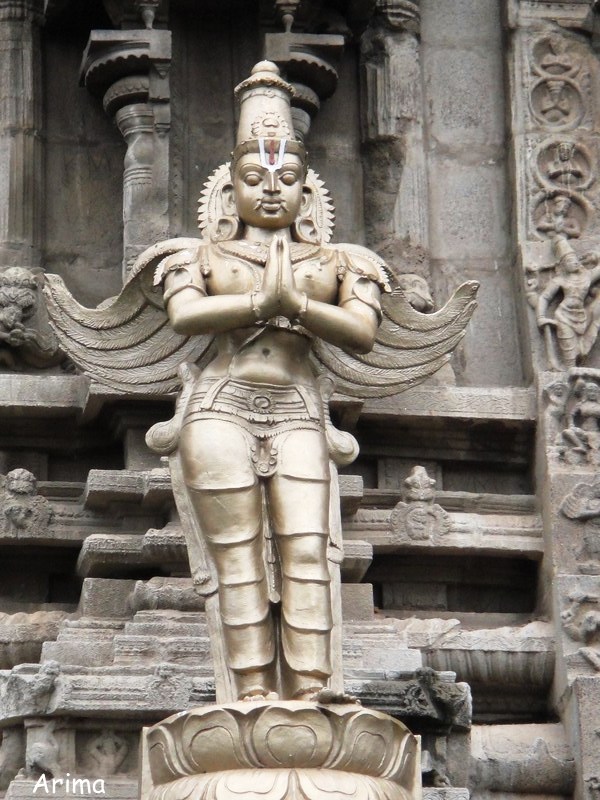
Table of Contents (The Complete Mahabharata in Simple English)
Previous Post: Takshaka Seeks Indra’s Protection
| Note: In the previous post, we read about the difference between how Takshaka and Vasuki responded to the threat of Janamejaya’s snake sacrifice. Takshaka sought personal protection from Indra, while Vasuki, wanting to save his family and race, called out to his sister, Jaratkaru, for help. In this post, we’ll read about how they asked Jaratkaru’s son, Astika, to bring an end to the snake sacrifice. |
Calling his sister, Vasuki said, “O sister, my legs are burning and I can’t see anything clearly. I’m about to lose consciousness. I’m feeling numb and heartbroken, I think I too might fall into the sacrificial fire created to exterminate our race. O sister, O best of women from the race of the serpents, your marriage with Rishi Jaratkaru was performed to save our family and race. Your son, Astika, has been designated by Brahma Deva himself to put an end to Janamejaya’s snake sacrifice. It is time, dear sister, to request Astika, who is learned in the Vedas and respected by the noble sages, to perform his role and save the serpents.”
Jaratkaru, the serpent lady, called her son and said, “O child, my brother bestowed me in marriage to your father for a special purpose. The time has come to fulfil that purpose. O son, you must do what needs to be done.”
Astika replied, “O mother, please tell me the reason why you were married to my father. I want to understand everything and take the correct actions.”
Jaratkaru, the great serpent lady, remained calm and steady even though she was aware that snakes were perishing in thousands and explained everything to her son. She said, “O son, a long time ago, Kadru, the mother of the snakes commanded her sons to make the tail of the celestial horse (Uchchaisravas) appear black because she wanted to win a bet with Vinata. However, her sons refused to do her bidding and she cursed them in anger. She cursed them saying they would perish in a sacrifice performed by King Janamejaya and would then go to the realm of unredeemed spirits. Brahma Deva himself assented to the curse as soon as it was uttered.”
Then Jaratkaru told her son how her brother, Vasuki, played an important role in the churning of the ocean. After the ocean had been churned and the devas gratified by drinking the amrit, Vasuki approached them for help to save the serpents from perishing due to Kadru’s curse. The devas accomplished Vasuki to Brahma Deva to request him to nullify the curse and save the serpents.
Brahma Deva assured Vasuki that, in the future, a sage called Jaratkaru would marry a maiden by the same name and their brahmin son would bring relief to the snakes.
After explaining the background events to her son, Jaratkaru said, “Hearing Brahma Deva’s words, my brother Vasuki, the best of snakes, bestowed me in marriage to the high-souled sage, Jaratkaru, sometime before the snake sacrifice began. O son, O child of godlike looks, you were born from that marriage and now the time has come for you to protect us from this danger. O son, what are your thoughts on this matter?”
Astika immediately replied, “Yes I will protect the serpents.” Then he spoke to his uncle, Vasuki, saying, “O great being, O best of snakes, please do not be overcome by worry. I will relieve you and the serpents from this curse. I have never uttered a lie even in fun, so nothing more needs to be said. I will go immediately and convince Janamejaya, with proper words and blessings, to stop the sacrifice.”
Before leaving, Astika assured his uncle that his resolve would not go unfulfilled.
However, Vasuki, being afflicted by the curse (and maybe also the sacrifice) said, “O child, my head is swimming and my heart is sinking. I’m not even able to distinguish the different points in the space around me.”
Hearing his uncle’s words, Astika once again assured him saying, “O best of snakes, please do not worry about the fire of this yagna which, right now, looks like the fire that blazes at the end of a yuga. Please be assured that I will extinguish it.”
| Note: In the next post, we will find out what happens when Astika reaches the site of the snake sacrifice. |
Table of Contents (The Complete Mahabharata in Simple English)
Next Post: Astika Reaches the Location of the Snake Sacrifice





